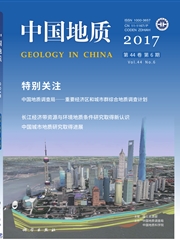

 中文摘要:
中文摘要:
利用高分辨率激光粒度仪MS2000对陕西渭南、北京灵山、河南邙山等地大量黄土样品的粒度多组分分布特征进行了系统研究,总结了其多组分粒度分布及组分间差异特征并讨论了源区距离对黄土粒度多组分分布特征的影响。取得了以下认识:(1)黄土粉尘粒径以〈70μm的悬浮组分为主,其粒度由细、中、粗3个组分(中值粒径范围分别为〈1μm、1~10μm、10~70μm)构成,表现为多组分粒度特征。粗粒组分含量最高,峰形最明显。粗粒与中粒组分粒径与百分含量变化很大程度受控于源区距离变化。(2)不同地区黄土粉尘粒度差异明显,粗粒组分中值粒径随源区距离增加而减小,二者负相关;中粒组分百分含量随源区距离增加而增加,二者正相关。(3)粒度组分分离方法能够反映同一源区粒度的细微差异,显示其粒度组分分离的优越性。(4)理论推导了黄土粗粒组分的中值粒径与源区距离的关系并用实际拟合函数验证了其正确性。
 英文摘要:
英文摘要:
By using high-resolution laser grain-size instrument Mastersizer 2000, the authors performed a systematic study of the grain-size distribution characteristics of loess samples from Weinan in Shanxi province, Linshan in Beijing and Mangshan in Henan province, summed up the differences in multimodal grain-size distribution among three types of loess and discussed the influence of the dust source distance, on the multimodal grain-size distribution characteristics of loess. The main conclusions are as follows: (1) Suspended particles with a diameter of 〈70 μm are dominant. There are three fractions for grain size distribution of loess: fine, mediun and coarse (the median sizes are 〈1μm, 1-10 μm and 10-70μ m, respectively). The coarse fraction, which has the highest percentage, has the most distinct peak. The grain sizes and percentages of the coarse and medium fractions are controlled by the source distance. (2) The grain sizes of loess dust in different areas are notably different. The median grain size of the coarse fraction decreases with increasing source distance, showing a negative correlation; whereas the percentage of the medium fraction increases with increasing source distance, showing a positive correlation. (3) The separation of grain size fractions can reflect the minute difference in grain size in the same source region and has advantages. (4) The relation between the median size of the coarse fraction of loess and the dust source distance may be deduced theoretically and its correctness may be checked and validated by the actual fitting function.
 同期刊论文项目
同期刊论文项目
 同项目期刊论文
同项目期刊论文
 期刊信息
期刊信息
